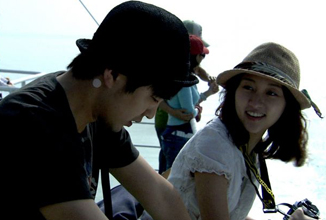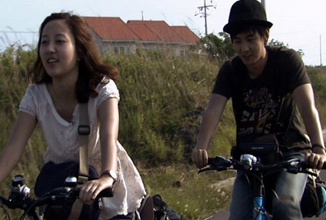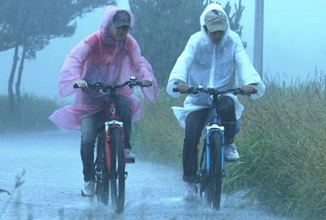The Trip consists of three separate stories (or journeys, if you like), all set in the idyllic surroundings of Jeju, a small island southwest of the Korean peninsula, famous for (amongst other things) its abundance of rocks, wind and women...
The first of the three tales within The Trip details the holiday of friends Geong-mi (Park Joo-hee) and Jun-hyeong (Park Sang-gyoo), who have travelled to Jeju to backpack around the island, taking photos for a competition along the way:
Geong-mi is a feisty lady clearly used to getting her own way - subconsciously determined to take control of every situation that she and Jun-hyeong find themselves in (often by insisting that a decision/difference of opinion be settled by means of a game of rock, paper, scissors) - endlessly willing, and perfectly happy to bend the far more passive Jun-hyeong to her will. However, far from appearing simply forceful or willful, her character's fun-loving personality and love of life shine out for the entire length of the tale and it's blatantly obvious that Jun-hyeong just can't help but let her have her way, no matter how hard he tries not to.
A far quieter personality than Geong-mi, Jun-hyeong is sure he knows his own mind and is certain that he understands his friendship with Geong-mi, but he couldn't be more wrong, and though it's abundantly clear from the outset that Geong-mi and Jun-hyeong not only have feelings for each other but have, in fact, already fallen in love, they are not yet at the point where they can admit it to themselves, never mind each other. As we gradually watch their relationship unfold, the feeling of burgeoning first love is beautifully palpable - with every bicker; every huff; and every single stolen glance loudly speaking the words that neither Geong-mi or Jun-hyeong can yet say.
However, as they travel around Jeju, through its hills, along its roads and across its junctions, Geong-mi's discovery that Jun-hyeong is to undertake military service, and her resultant declaration that she is going to the US, bring our would-be couple to a junction in their own relationship, right at the very beginning of their possible journey through life together.
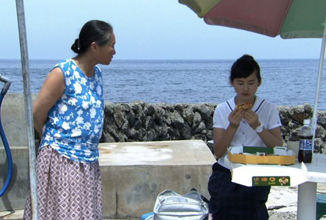 |
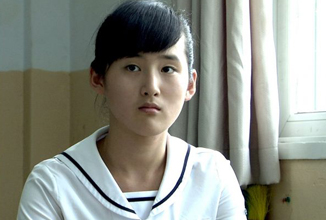 |
The second story of the trilogy tells the tale of schoolgirl Su-yeon (Kim Ji-eun) who has lived in Jeju with her ailing grandmother since her mother ran away, when Su-yeon was little. Tired of school and desperate to find out why her mother abandoned her, Su-yeon is determined to travel to Suwon (a province on the mainland where her mother is thought to be) and discover the truth behind her situation once and for all, but as she attempts to determine her mother's exact whereabouts, Su-yeon is shocked to learn that her mother is actually a lot closer than she previously thought.
This section of The Trip deftly brings the stresses and strains of modern day living to the fore, showing how the fallout from Su-yeon's mother's decision to leave her family has affected both her and Su-yeon to a massive degree, and has impacted on almost everything that each of them has done ever since.
Su-yeon simply doesn't understand why her mother left and cannot shake the fear that it may have been because of her, or something she did, and the question quickly becomes whether the two characters can ultimately put the pain of the past behind them and move towards a brighter, and altogether sunnier, future - and whether that future will be together or alone.
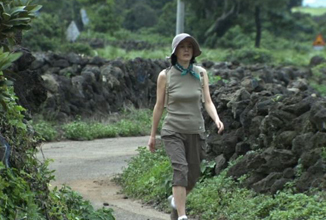 |
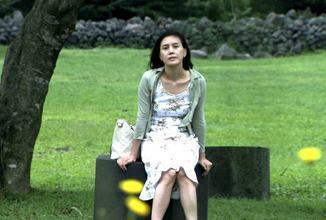 |
The Trip concludes with the story of wife and mother Yeong-ok (Yang Eun-yong), who in total contrast to the characters in the previous tale, has sacrificed her own needs for her family ever since the day she married. In danger of losing her identity (and herself) completely, she has travelled to Jeju to escape her responsibilities (and those whom she is responsible for), switching off her phone and cutting lines of communication with her family in a desperate attempt to find her "self" and clear her confused and cluttered mind in the calming and beautiful surroundings of Jeju.
Initially unsure of where her journey will take her (as are viewers), Yeong-ok's story serves not only as a dissection of the roads traversed in life and the resultant sacrifices that are demanded, but also as a revealing look at "what might have been" for Su-yeon's mother (in the previous tale), if she had chosen to go down an altogether different path.
While the three stories are indeed separate and (from the characters' points of view) unrelated, from a viewer's perspective there is a clear link binding them together - life itself - and, just like their travels around the island, each character is at somewhat of a junction in their journey through life, with the eventual road to be taken yet to be decided. From the early hesitant, and as yet outwardly unspoken, steps towards love of Geong-mi and Jun-hyeong; through the effect that Su-yeon's mother running away has had on both her daughter and herself (and the importance of Su-yeon's grandmother in shaping who Su-yeon is, as a person); to how Yeong-ok's sacrifices for her family have caused her to come close to losing herself in the process of fulfilling her responsibilities, The Trip plays almost like a single journey, highlighting the junctions met, the paths chosen, and the roads not taken along the way - from youth; to adulthood; to middle age; to the twilight years of living.
Cinematically, The Trip is accomplished throughout. Though filmed entirely on digital film, that fact is barely perceptible, save from being briefly (but not overly) apparent in a couple of scenes. Full justice is given to the sheer beauty of Jeju Island, and the success with which the surroundings play an almost supporting role in proceedings (while remaining centre stage) ensures that this heartfelt and heartwarming tale will be remembered for both its characters and the stunning vistas in which they find themselves.
Summary:
An utterly beautiful film, in both its story and setting, The Trip fully deserves every accolade beginning with "heart" that you could possibly think of.
Cast:
Park Joo-hee, Park Sang-gyoo, Kim Ji-eun, Yang Eun-yong, Kim Yoo-mee
|


